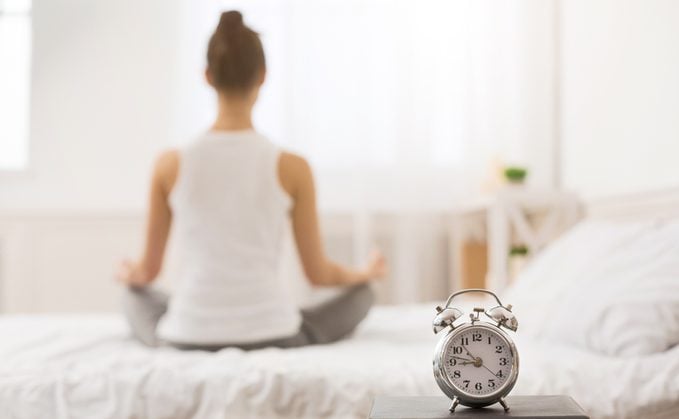This Is the Best Time to Meditate, According to Experts
Updated: Mar. 16, 2022
When is the best time to meditate to reap big benefits? It depends. Experts share optimal times that can help you calm your mind and body.
Our editors and experts handpick every product we feature. We may earn a commission from your purchases.
What is meditation?
Meditation is one of the buzziest topics in the health and wellness world today, and for good reason.
In addition to the mental health benefits of meditation, like less stress and anxiety and improved mood, it has been shown to reduce pain, lower blood pressure, and enhance cognitive performance.
This is all thanks to the way the practice helps you connect with the world around you.
“Meditation is paying attention on purpose with an engaged curiosity,” says psychologist and mindfulness expert Elisha Goldstein, founder of the Mindful Living Collective, an online mindfulness support community. “It’s about being aware and awake to what’s happening in the moment, just waking up to life.”
The process of “waking up” to life gives you the ability to better regulate your body’s responses to stressful situations, giving you a degree of control over a situation that previously may have sent you into a spiral.
Goldstein offers the example of reading the news. Depending on the content, it might send signals to your brain that can make you feel anxious.
This anxiety may cause you to snap at your partner, which can make you feel bad, which then prompts you to read the news to distract yourself.
“You get trapped on autopilot and fall into an anxious loop, which we are finding is creating an increasing amount of stress, anxiety, and depression in our culture,” he explains. “With meditation, we can be more in the driver’s seat of how we choose to respond to things. So if we get triggered, we can take note of that and realize we might need some soothing in that moment. And when we feel this agency, we feel more relaxed and happier.”
Even just 15 minutes of meditation yields some big health benefits. It can reduce pain, help you sleep better, and boost your heart health.
Types of meditation
Meditation comes in a variety of forms, some of which have steps for you to follow and some of which don’t.
“There are more formal practices, like sitting, moving, breathing, loving-kindness, and gratitude,” says psychologist B. Grace Bullock, author of Mindful Relationships. “But personally, my most powerful meditation practice is unplugging and taking my dog for a walk and observing my experience and what’s around me.”
Regardless of the type of meditation you choose, you’ll reap different benefits depending on the time of day you choose to meditate. Keep reading to find out how meditation can benefit you at all hours of the day.
When you wake up
“I think the morning is a great time to meditate, if you’re able to,” says Goldstein. “It sets your mind up to pay attention in a particular way during the day, to be more curious, more grounded, and more aware of your intentions and how you want to be.”
Indeed, morning meditation helps set the tone for your day. Plus, it may be easier to make the practice a habit if you are incorporating it into your set morning routine.
“Pair your tea or coffee or something that you’re already doing with sitting down in meditation for five minutes,” suggests Goldstein. “This will make it easier to remember or easier to do.”
Of course, you’ll want to take into consideration when your body and mind functions best.
“I’m a morning person, so for me, it’s easier to meditate when I’m awake and alert and receptive in the morning,” adds Bullock. “That’s often when I get my inspiration for work or writing or something creative. Later in the day, if I’m too tired and try to sit and meditate, I might fall asleep.”
Night owls may have the opposite problem. If you’re sluggish in the morning, you might fall asleep while trying to meditate.
And if you already have a hard time dragging yourself from bed, you’re less likely to stick with a morning meditation habit than if you set aside time later in the day.

When you finish work
The space to meditate may appear in a moment of transition during your day.
“When you’re getting home from work and before you walk into the house, you can take a minute to pause and ask yourself how you want to be as you transition from work to home,” suggests Goldstein.
Post-work meditation can also be spontaneous, such as when your baby finally falls asleep on your chest.
“There’s an opportunity there to be present to the connection and sensation,” Goldstein says. “That can be very soothing to your nervous system.”
(Here are some tips for meditating while lying down.)
In your free time
Depending on your schedule and your lifestyle, you may not be able to set aside a few minutes to meditate at the same time every day—and that’s OK!
“The most important thing is creating that space for yourself,” says Bullock. “If I have a 7 a.m. meeting and I can’t meditate that morning, I try to find the space elsewhere.”
Before bed
If you aren’t a morning person, there are other perks you can get from meditating before you climb into bed at night.
“The benefit of meditating before bed is that it can potentially calm the nervous system down after a hectic day,” says psychotherapist Marianela Medrano, founder of the Palabra Counseling and Training Center in Stamford, Connecticut. “For instance, doing breath-centered meditation, or meditation that uses the breath as an anchor, is an excellent way to unwind from the day.”
Bedtime meditation can also be helpful for those who can’t sleep through the night.
“I used to struggle deeply with insomnia,” says Goldstein. “I started using a body scan meditation before bed, and it completely cured my insomnia.”
To do this type of meditation, focus on every inch of your body, moving your attention slowly from one part to the next. Goldstein says that whether you follow this type of meditation or another, such as audio-guided meditation, you’ll help your mind relax so your body can fall asleep.
Be consistent with your meditation practice
How long you meditate isn’t super important. What matters most is establishing a consistent practice. Choose a time that you’ll stick to.
“Someone who has to leave the house early in the morning and has more time to meditate at night will likely stick to the practice if they do it when the time allows,” says Medrano. “Consistency is key, and we are most likely to be consistent with the practice if we don’t feel pressured or stressed when we do it.”
Consistent meditation will put you in a better mental space than you were in before.
To get started, check out our beginner’s guide to meditation. Or try these meditation tips to make you more mindful throughout the day.


















